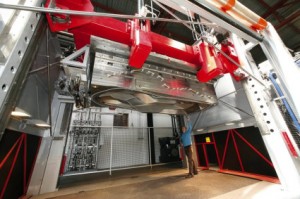
Automakers are targeting all areas of the car in their quest for lightweighting and in future, they may even consider switching from heavy steel leaf springs employed in suspension systems due to a joint development of polyurethane supplier Henkel (Dūsseldorf, Germany) and composite component manufacturer Benteler-SGL (Ried im Innkreis, Austria). Working with Benteler-SGL, Henkel has developed a process for resin transfer molding (RTM) of glass-fiber-reinforced leaf springs that uses a polyurethane matrix resin. Compared to conventional leaf springs made of steel, these composite leaf springs are up to 65 percent lighter.
With Loctite MAX 2, Henkel is offering a polyurethane-based composite matrix resin that cures significantly faster than the epoxy products usually employed for the RTM process. Due to its low viscosity, the polyurethane resin reportedly penetrates and impregnates the fiber material more easily and less harshly, thus enabling very short injection times to be applied. One special feature of Loctite MAX 2 is its exceptionally high stress intensity factor, which is a measure of toughness. This excellent toughness also has a positive effect on the fatigue behavior under load. Leaf springs in cars are constantly subjected to dynamic loading under driving conditions, so the use of flexible materials with a high fatigue tolerance considerably prolongs the life of such components.
Resin injection processes such as RTM predominate in the manufacture of automotive composites for mass-produced automobiles because they make it possible to control the curing reaction more reliably, either by adjusting the temperature or adding an accelerator. Furthermore, the risk of local overheating and resulting shrinkage is reduced, as the polyurethane resin Loctite MAX 2 reportedly generates less heat overall during curing than epoxy resins do. As a result, even thick components with many fiber layers cure fast. The RTM process is especially attractive for volume production of cars as fast curing of the matrix resin permits short cycle times to be achieved.
The product range of Benteler-SGL, a joint venture of Benteler Automobiltechnik and the SGL Group, includes body shell components such as side blades, doors and visible carbon components. The composite components, which are designed specifically for mass-production consist mainly of carbon and glass fibers in various textile forms such as stitched or woven fabrics. Customers include almost all the big names in the automotive industry, primarily in the premium class.
“While developing these composite leaf springs, the competencies of Benteler-SGL and Henkel complemented each other perfectly,” says Frank Deutschländer, Global Market Manager Automotive at Henkel AG & Co. KGaA. “With our matrix resin technology Loctite MAX 2, we were able to establish a new process at Benteler-SGL that is tailored to the automotive industry and gives this fiber composite component an attractive properties profile.”
Given the more stringent CO2 exhaust standards, lightweight construction is becoming ever more important for the automotive industry but at the same time, safety cannot be compromised. Composite components from Benteler-SGL help to reduce fuel consumption while offering a high level of safety. “Thanks to our intensive collaboration with Henkel, we have succeeded in producing a resin transfer molded glass fiber reinforced leaf spring for the automotive industry that not only combines low weight with high strength but is also mass production capable. It thus also satisfies the highest expectations in terms of cost-efficiency and process reliability,” says Frank Fetscher, Head of Sales and Marketing at Benteler-SGL Automotive Composites.
Source: http://www.plasticstoday.com/articles/leaf-springs-turn-composites-lightweighting-polyurethane-rtm-20130405a





